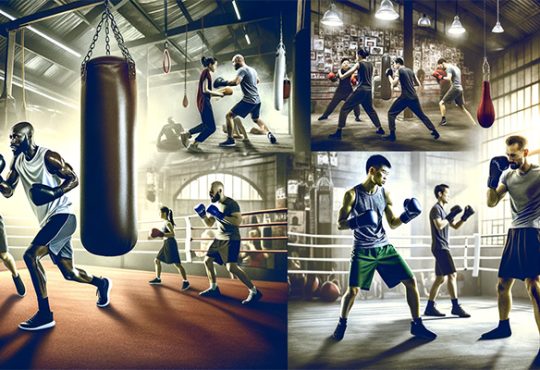
Proven Ways Boxing Builds Your Self-Confidence
You ever walk into a boxing gym—not some glossy chain, but the kind where the walls sweat history—and instantly feel like you’ve stepped into something bigger than just fitness? That’s what pulled me in years ago. Not just the sound of gloves on leather or the smell of canvas and iron, but this raw, honest energy. And here’s the thing: people aren’t showing up just to throw punches anymore. Across the U.S., more and more folks are lacing up for reasons way deeper than the ring—mental clarity, self-belief, emotional grit.
You’re gonna see how boxing builds more than muscle. It rewires your mindset. Let’s break down how.
Why Boxing Is More Than Just a Sport
You don’t step into a boxing gym just to throw punches anymore. At least, that’s not what’s pulling most people in—not these days. What I’ve seen, especially in urban gyms and boutique studios popping up across the U.S., is that boxing has evolved into a full-blown self-development tool. It’s not just the physical grind—it’s the emotional payoff.
Big-name fitness franchises like TITLE Boxing and Rumble are cashing in on it too. But the energy inside? That’s different. It’s Gen Z showing up to process stress, young professionals looking for purpose, even parents rediscovering confidence they thought was long gone. It’s real, and honestly, it’s powerful.
Here’s what boxing’s done for people I’ve trained with—and for me, personally:
- Mental discipline: You can’t coast in the ring. Your mind sharpens or you get hit—simple as that.
- Emotional release: Punching it out after a rough day? It’s therapy with gloves on.
- Confidence boost: There’s something about seeing your own strength in the mirror that rewires how you carry yourself.
- Routine & motivation: Structure builds momentum. And momentum changes everything.
So yeah, boxing might look like a sport on the surface—but underneath? It’s a wellness practice, a mindset shift, a full-on rebuild. You’ll feel it the first time you walk out of a session… taller, lighter, clearer.
Physical Mastery Builds Mental Resilience
You ever notice how your brain gets quieter when your body knows exactly what it’s doing? That’s no accident. In boxing, the confidence you build isn’t just mental—it’s baked right into your physical control. When your punches land with purpose, your feet glide instead of stumble, and your breath syncs with the rhythm—that’s muscle memory transforming into self-belief.
In my experience, physical mastery doesn’t just support mental resilience—it creates it. You don’t feel fragile when your body is dialed in. You feel ready. Grounded. Capable.
Here’s what I’ve learned from working with fighters at all levels:
- Repetition drills force your mind into focus—it’s like mental weightlifting.
- Controlled aggression teaches you how to stay calm under pressure (a lifesaver outside the gym too).
- Proprioception and muscle control make you more aware of your presence—how you move, how you hold yourself.
- Cardiovascular endurance builds this quiet confidence—you know you won’t gas out when things get tough.
Boxing fitness confidence doesn’t come from flexing in the mirror—it comes from knowing you’ve done the work. And once you feel that? You carry it everywhere. Not just in the ring, but in how you walk into a room.
Discipline and Routine Shape Self‑Belief
You walk into the gym on a gray morning, tie your gloves the same way, and something in you clicks — routine starts to do quiet work on your confidence. Habit formation turns discrete actions (morning training, habit stacking, the daily grind) into evidence you can trust. Over time that evidence rewires behavior: self-regulation becomes identity, and your sense of self shifts from “trying” to “being” a boxer.
Here’s what you’ll notice as routine compounds:
- Consistent drills build muscle memory and gym loyalty — you see progress, and that’s huge for confidence habits.
- Small wins (hitting a mitt pattern cleanly) translate into stronger self-regulation and belief.
- Mental tracking of workouts trains your brain to expect follow-through — that expectation becomes self-trust.
- Habit stacking (warm-up + 10 mins of shadowboxing) makes discipline automatic, not negotiable.
Stick with the schedule; your athletic development will start changing how you think about yourself.
Facing Fear and Controlled Stress Builds Courage
That first time you step into sparring? Yeah, your body knows. Your hands might be wrapped tight, but your gut twists, your throat dries up, and your brain hits full fight-or-flight mode. That rush? Totally normal. In fact, that’s where the real mental gains begin.
What I’ve found—after years of watching boxers flinch, freeze, then find their footing—is that sparring works like exposure therapy. You learn to stay calm while your adrenaline’s screaming. That’s not just boxing courage. That’s life courage.
Here’s how controlled stress in the ring builds resilience:
- Micro-sparring (short, focused rounds) helps reduce sparring anxiety without overloading your nervous system.
- Situational drills teach emotional regulation—you learn to pause before panicking.
- Repetition under pressure rewires performance anxiety into confident instinct.
- Adrenaline control gives you the mental edge—you’re not just surviving; you’re responding.
You’ll still feel fear sometimes. But when you’ve faced a glove coming at your face and stayed composed? You start to trust yourself in chaos. And that kind of self-trust? It sticks with you, inside the ropes and out.
Self-Defense Skills Create Empowerment
There’s a shift that happens the moment you realize you could defend yourself if you had to. Not in some movie-scene fantasy way—but real, practiced, fight-readiness. I’ve seen it again and again, especially in women who’ve started boxing later in life. The way they stand taller, walk with more awareness… it’s subtle, but it’s unmistakable. That’s empowerment in motion.
And honestly? It makes sense. According to recent U.S. surveys, nearly half of Americans—especially women and folks in urban areas—report feeling unsafe walking alone at night. But when you’ve drilled de-escalation, practiced spatial awareness, and trained your reflexes through boxing? Your body knows what to do. That confidence sticks.
Here’s what I’ve seen firsthand:
- Women’s boxing training flips the script—fear turns into power.
- Street-awareness drills help you scan your environment without panic.
- Confidence walk becomes real when your nervous system isn’t in fight-or-freeze mode.
- Self-defense knowledge boosts your personal protection and self-esteem more than any gadget in your purse.
You don’t train just to fight—you train so you don’t have to. And that kind of quiet confidence? You carry it with you, block by block, every damn day.
Boxing Builds Mental Grit and Delayed Gratification
Let’s be real—boxing isn’t for the instant-results crowd. You won’t master your jab in a week, and you definitely won’t develop real ring composure without months (sometimes years) of showing up, grinding, plateauing, adjusting, and grinding again. That slow burn? That’s the whole point. What you’re building isn’t just a better left hook—it’s long-haul mental grit.
In American sports culture, we love the idea of hustle. But boxing forces you to live it. Every time you drag yourself into training when you don’t feel like it? That’s grit training in action.
Here’s what I’ve learned through the grind:
- Plateaus aren’t failures—they’re invitations to grow smarter, not just harder.
- Stick-to-itiveness becomes part of your identity—you stop quitting on yourself.
- Delayed gratification shows up in subtle ways: better timing, deeper endurance, sharper instincts.
- Slow progress is humbling—but that’s exactly what makes the results feel earned.
You want sports confidence? Earn it over time. Boxing doesn’t hand you wins—it makes you become the kind of person who earns them. And that identity shift? That’s where the real transformation happens.
Community and Support Systems Reinforce Self‑Worth
You can train alone, sure—but you’ll never grow alone. Every boxer I’ve ever known who lasts in the sport finds a gym tribe that keeps them grounded. Walk into a place like Gleason’s in Brooklyn and you’ll feel it immediately—the hum of jump ropes, the rhythm of bags, and the quiet respect that passes between fighters. That’s not just gym culture; that’s belonging.
In my experience, confidence isn’t only built from throwing punches—it’s from the people who remind you who you are when you take them. The coach who calls you out (because he actually believes in you), the training partner who holds pads at the end of his own workout, the crew that shows up at 6 a.m. just to sweat together—those connections shape you as much as any round in the ring.
Here’s what I’ve seen time and again:
- Mentor‑coach relationships build self‑belief faster than any motivational quote.
- Training partners create accountability through tough love and shared struggle.
- Encouragement loops in local gyms fuel consistency, especially on bad days.
- Inclusive boxing spaces give everyone—from amateurs to pros—a sense of worth.
You find your fight family, and suddenly you’re not just training—you’re becoming someone stronger because they’re in your corner.
Tracking Progress Strengthens Internal Validation
You ever flip through an old boxing journal and realize how far you’ve come? That’s one of my favorite moments in training—it’s quiet, personal, and it hits you harder than any compliment ever could. Progress tracking isn’t just about data; it’s about proof that your effort means something.
Now, I think too many people chase external validation—the win, the belt, the praise—but the real growth comes when you start validating yourself through evidence. Every punching power log, every round completed, every tiny improvement in your heart rate zone tracking—it all adds up. You start to see your consistency, and that becomes fuel.
Here’s what’s worked for me and a lot of the fighters I’ve trained with:
- Boxing journals keep your focus honest. You can’t lie to the page.
- Performance metrics show tangible gains—speed, control, stamina.
- Body-scan awareness teaches you to feel subtle progress, not just see it.
- Visible progress cues (even something small like a cleaner combo) rewire your self-image.
Before long, you stop needing outside approval. Your own effort becomes enough—and that kind of internal motivation? It’s what keeps you in the fight when no one’s watching.
Boxing Confidence Takeaways in the American Context
You see it everywhere now—boxing gyms popping up next to coffee shops, after-work classes filled with people shaking off the stress of another long day. There’s something uniquely American about that. It’s grit meets therapy. Hustle meets healing. And honestly, it fits right into the way our culture craves both challenge and connection.
What I’ve found is this: boxing isn’t just about punching your way to fitness—it’s a confidence practice disguised as cardio. Between the endorphins, the structure, and that unshakable boxing mindset, you start living what I call a resilience lifestyle. You stop chasing quick fixes and start earning your self-worth through consistency. That’s where real transformation begins.
If you’re feeling stuck, anxious, or just burned out, maybe it’s time to step into a ring—or at least a local gym that feels like home. Find your tribe, sign up for a class, and give yourself a few rounds to figure it out. Because once you experience confidence through fitness, you won’t just move differently—you’ll think differently. And that change sticks long after you leave the gym.




